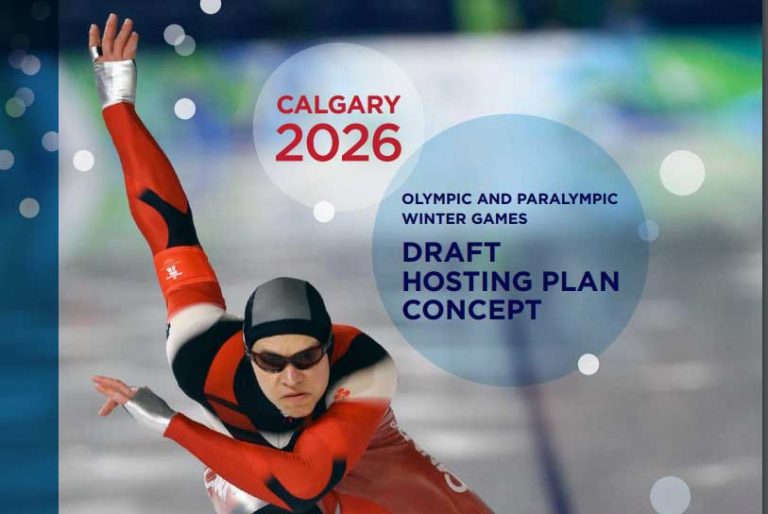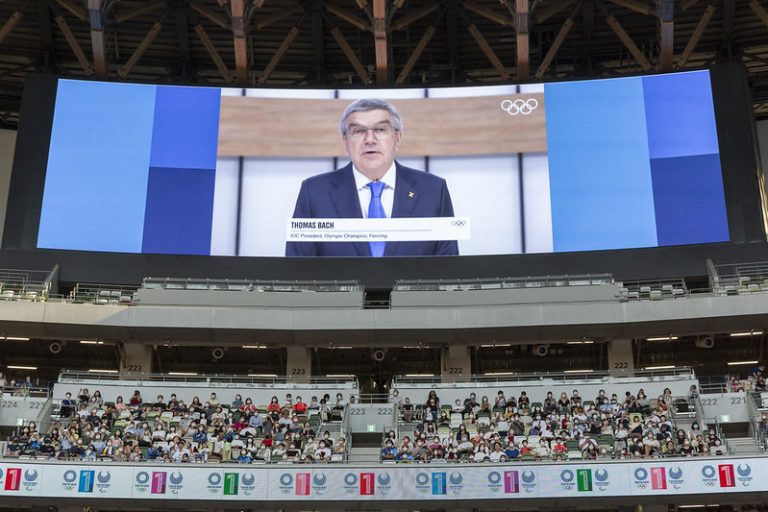International Olympic Committee (IOC) Executive Director Christophe Dubi was in Calgary Tuesday to face Olympic bid questions from members of the media and the general public at a ticketed Chamber of Commerce event where he emphasized “we have to turn the page.”

The speaking event, also attended by the IOC’s Hannah Burns and Calgary 2026 bid Chair Scott Hutcheson, marks a rare occasion where the Olympic organization has addressed the local citizens during an Olympic bid campaign.
Dubi came prepared to “speak about the measures that fundamentally rethink how the Olympic Games are delivered and can be aligned with the long-term development plans of the city, region and country,” an IOC spokesperson told GamesBids.com.
Calgary “doesn’t start from scratch,” Dubi said about the city’s plans to leverage facilities built for the 1988 Olympics, limiting new construction and risk.
He also told the group that “we do not expect an unlimited financial guarantee,” something that had been a contentious requirement with previous bids. Instead, Dubi said, the IOC will work closer with the organizing committee to manage the budget and mitigate possible overruns. He described insurance coverage and contingency funds as ways to minimize risk to taxpayers.
Dubi further explained that when the ‘Big Air’ event was added to the PyeongChang 2018 Winter Games after the host city contract was signed, the IOC covered the additional costs.
“We, the IOC, must do things differently,” Dubi added.
“We want true partnerships founded on openness and transparency, hosting the Games only makes sense if they make sense economically, socially, and environmentally.
“We will partner to this objective.”
The IOC was also involved in public consultation events in its home country of Switzerland ahead of Sion’s Olympic bid referendum that was lost by proponents of the project. Sion was forced to drop its bid last month.
In the past the IOC has steered clear of any local involvement during bid campaigns, striving to show a neutral stance during what had been fierce competitions to host the Games. But with four of six cities dropping 2022 Winter Games bids, three of five cities canceling 2024 campaigns and already two of seven out of this 2026 race – the IOC has rewritten its playbook and is working harder to be part of the conversation while taking ownership of its own Olympic brand.
The stakes remain high for the IOC in Calgary as the Canadian city approaches a decisive plebiscite over the bid later this year. Other cities that have expressed interest in hosting the Games are still struggling to make it to the start line including in Stockholm where the Swedish city lacks government support; in Sapporo as the 1972 Japanese host considers delaying the project until 2030 instead; in Italy where the National Olympic Committee has succumbed to politics as three cities are still fighting to become the named bid; and in Erzurum where lack of experience and high security risks could force the IOC to exclude the Turkish city from the short list.
From costs and venue capability to community needs and security concerns- no topic was left untouched this morning as we talked with the International Olympic Committee. #yyc pic.twitter.com/4JQp36u1lV
— Calgary Chamber (@CalgaryChamber) July 24, 2018
Last week IOC President Thomas Bach warned that only qualified bids would be added to the final ballot when the IOC Session elects a winner in September 2019, emphasizing that number could be as low as two. But the reality is, the IOC will likely need to fight to keep that many options in the competition.
Dubi claimed, however, should Calgary voters reject the bid – there will be “no harm done.”
Both ‘yes’ and ‘no’ plebiscite campaign forces rallied in advance of the highly-anticipated speaking event in Calgary. ‘No Calgary Olympics’ criticized that the event was too exclusive and the CAD $100 tickets sold out quickly, but ‘Yes Calgary 2026’ countered that the event was effective and typical of previous election debates.
Jason Ribeiro, a Yes Calgary 2026 organizer told GamesBids.com “The potentials that exist for our city and the Games are immense.”
“While some frame the Games as a 2-week party, an economic quagmire, our legacy facilities stand as proof that they are neither.
“30 years of legacy. 30 years that has resulted in the hosting of over 200 international events, hundreds of North American events, many National Championships, and countless provincial and local offerings.”
Dubi and his team are scheduled to meet with Calgary 2026 representatives and Calgary City Council members later Tuesday.
The IOC will announce a short-list of candidates in October, and in January those cities are expected to deliver bid books and financial guarantees. An IOC Evaluation Commission will visit candidate cities in February and March.


